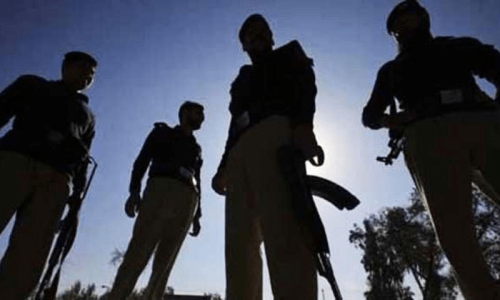WASHINGTON, Nov 19: The United States and Pakistan are working on a strategy to squeeze Taliban and Al Qaeda militants from both sides of the Afghan border and eliminate them, says a senior US general.
Gen David D. McKiernan, who commands US and Nato forces in Afghanistan, said he was “cautiously optimistic” about this growing tripartite coordination among coalition forces, the Afghan national army, and the Pakistani military.
The statement, given during a power-point presentation at a Washington think-tank on Tuesday, indicated that the sudden increase in US air raids into the tribal, and now into settled, areas of Pakistan were part of this tripartite strategy to end insurgency.
Gen McKiernan said that operations conducted by the Pakistani military and Frontier Corps would force Taliban to remain on the Afghan side this winter. “And we are going to try to close with and destroy or eliminate those insurgent groups on the Afghan side of the border throughout the winter,” he said. “We are not going into a winter lowering of our tempo of operations.”
The general said there were indications that increased Pakistani security operations along its border were already having some effect on insurgents who took refuge in Pakistan and did their fighting mainly in Afghanistan.
He said that during a recent visit to Islamabad, he realised that there’s a need for reviewing US policy towards Pakistan because even senior Pakistani politicians had doubts about the American presence in the region.
He recalled that he met a group of 70 parliamentarians last week at the residence of the US ambassador in Islamabad and concluded that “we have a lot of work to do on the non-kinetic information perception side to work with leaders in Pakistan”.
“A couple of the questions I got were why did you Americans come to Afghanistan when it was so peaceful before you got there? … and then another one was we understand that you’ve invited a thousand Indian soldiers to serve in Afghanistan by Christmas.”
He added: “Some of you are looking at me like you believe that. But no, that's not true.”
This misperception, he acknowledged, showed that “we have a lot of work to do in a regional approach working with Pakistan, not just military to military, civilian to civilian, military to civilian as well”.
The general also advised Washington to adopt a regional approach to end violence in Afghanistan.
“This is a regional problem (and) will also require a regional approach to get to regional answers,” he said. “And specifically I look at Afghanistan and Pakistan as a regional problem set.”
Besides Pakistan, the Afghan neighbourhood also included India, China, Russia and Iran, the general added.
Gen McKiernan said that during the last six months he had seen a shift in thinking at the senior levels in Pakistan that this insurgency was a problem that threatens the very existence of Pakistan. And that they have to deal with it perhaps in ways that they didn’t contemplate a few years ago on their side of the border.
“And so I see willingness and a capacity although they have a long way to go to conduct counterinsurgency operations on the Pak side of the border,” he added.
Gen McKiernan said that a group of Taliban insurgents known as the Quetta Shura operated from Balochistan but it did not have the capacity to band together with other groups and launch a major offensive inside Afghanistan.
“What I find is the Taliban are very much localised, regionalised, syndicated. They have fault lines between different groupings inside the Taliban.”
“Most of the senior leadership of the Taliban operates from safe havens in Pakistan. They don’t come across the border in Afghanistan because they don’t feel too secure,” he added.















































Dear visitor, the comments section is undergoing an overhaul and will return soon.